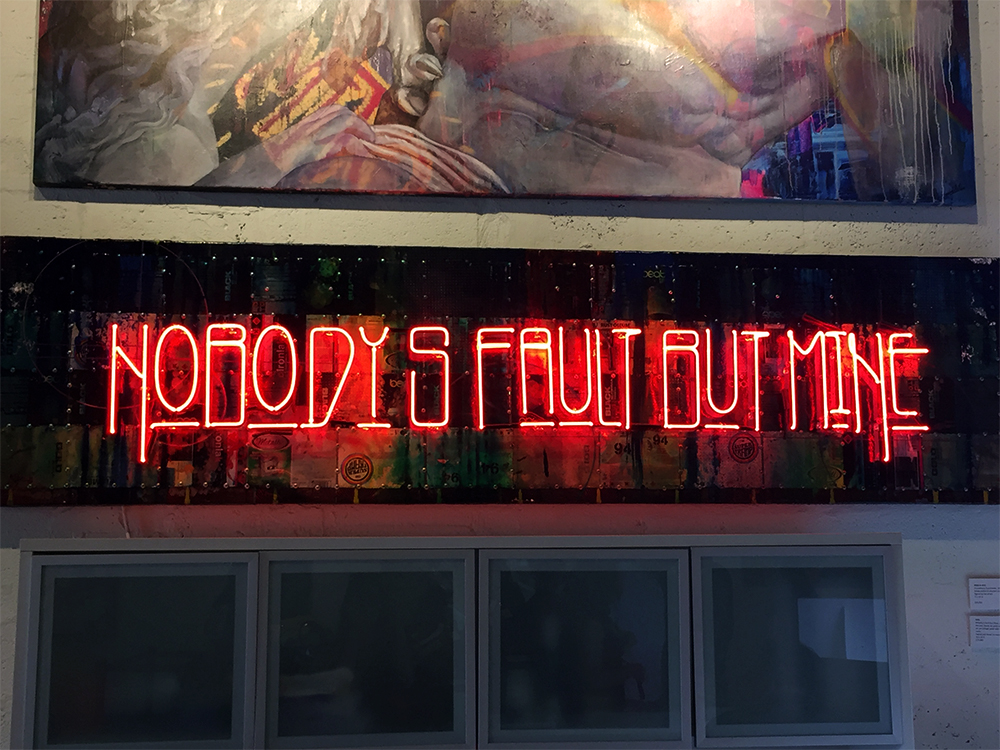Social media really is a nice tool. A dear follower suggested, that I could dedicate a blogpost to the English language. More specifically, the colloquial phrases and terms, here in the USA. I immediately liked the idea and the wheels in my head started to work. If you want to know what came out of it, just keep reading. Enjoy!
“WOW, WHAT A BEAUTIFUL BITCH.”
This quote needs an explanation. Still makes me smile when I think about it. Well… one day, when I did not suspect anything bad, I took my dog Joy for a walk. A man came up towards us and spoke these exact words. I still remember so distinctly how shocked I was. My horrified reaction took him off guard in turn. All a big misunderstanding, as I found out later at home. “Bitch” is not only an insult but the formal meaning for a female dog, too. I had no idea! So this guy was not being rude, he just talked to my cute doggo. My husband laughed his ass off, when I told him about this strange encounter.
THE PRONUNCIATION
I cross my heart, initially I had trouble understanding the people here. That was not because of a lack of vocabulary, rather more the fact that Americans pronounce words differently than I was used to. I always felt so stupid, when I had to ask like three times: “Pardon?” or “Could you repeat that, please?”. I am not very good with accents, obviously (I also have a hard time understanding Bavarian people).
But why is that? Like almost all Germans, I have learned English in school (5th grade). However, we are first taught British English only. Accordingly, I am more familiar with British phrases and terms than American ones. In addition, I have to come out as a fan of the British accent and humor. I love British movies… and apparently British folks, as well. Proof is my husband, who happens to be half English. Well done Anne, well done. My point is, before I moved to Miami, I mainly dealt with British English. That is why I had a hard time at first in Florida.
Like in every other country it depends on in which state or area you live, when it comes to different accents. People from the south tend to have a strong accent, in my opinion. That’s where concentration is needed. Furthermore, some of the syllables are swallowed, that makes it even more complicated for me to understand people.
Here are some examples, when it comes to pronunciation:
- give me – gimme
- I don’t know – dunno
- Kind of – kinda
- Want to – wanna
- What are you doing? – Watcha doin?
- Yes – Yeah
- You – Ya
If you talk to the locals here – which, fortunately, is extremely straightforward – you catch a lot. I also learned a lot from film and television.
BACK TO BASICS
In the following, I would like to introduce you to phrases and sayings, that I think you can use well here. Personally, I really like the very figurative formulations of which there are many in the English language.
My personal Top 15
- A pain in the ass – Qual, nervig
- Don’t judge a book by its cover – Zieh keine voreiligen Schlüsse
- Fair enough – meinetwegen, verständlich
- Having a hard time – Schwierigkeiten haben
- Home Sweet Home – Trautes Heim, Glück allein
- I hear you – ich verstehe dich wirklich, ich fühle mit dir
- I see what you did there – wenn man eine Anspielung/Witz versteht bzw. entdeckt
- Monkey Business – krummes Geschäft, Unfug
- Rumor has it – Gerüchten nach zu folge, es wird gemunkelt
- Spill the beans – ausplaudern, verplappern
- The tea is hot (Slang) – wenn man Kritik zu einem kontroversen Thema äußert
- There you go – bitteschön, na also
- Treat yourself – sich was gönnen
- Try me – versuch’s mal
- My bad – mein Fehler, meine Schuld
35 Phrases that make you look like an native
- A run for one’s money – sich um etwas besonders bemühen/anstrengen
- Are you with me? – Kannst du mir noch folgen?
- Bless you – Gesundheit (wenn jemand niest)
- Call it a day – Feierabend machen
- Close call – knappe Angelegenheit
- Cool your jets – beruhige dich, komm runter
- Cross my heart – Hand auf’s Herz, Ehrenwort
- Dead man walking – Todgeweihter, zum Tode verurteilt
- Drop the ball – Mist bauen/einen Fehler begehen
- Easy peasy – kinderleicht
- Excuse my French – sich für seine vulgäre Ausdrucksweise entschuldigen
- Face the music – die Suppe auslöffeln, für etwas geradestehen
- Get the ball rolling – den Stein ins Rollen bringen, mit etwas anfangen
- Give me a break – mach mal halblang, lass mich in Ruhe
- Going to town – sich ins Zeug legen
- Hang in there – halte durch
- Have it coming – sein Fett wegkriegen
- Having a blast – Spaß haben
- Hitting home – schmerzhafte Erkenntnis
- If you catch my drift – wenn du verstehst was ich meine
- Keep your eyes on the ball – konzentrier dich, bleib fokussiert
- Knock it off – lass das sein, hör auf damit
- Like a kid in a candy store – wenn man extrem aufgedreht/erfreut ist
- Not my cup of tea – nicht mein Ding/Fall
- On the same page – auf einer Wellenlänge
- Play hardball – aggressive Vorgehensweise
- Raise a red flag – Alarmglocken läuten
- Tell me about it – wem sagst du das
- That is nuts/bananas – das ist verrückt
- The ball is in your court – du bist am Zug, zeig was du kannst
- The day before yesterday/the day after tomorrow – vorgestern/übermorgen
- The other day – letztens
- To be down for something – bei etwas dabei sein
- To get something out of one’s system – etwas seelisch rauslassen/verarbeiten
- Your call – musst du wissen, das ist deine Entscheidung
20 terms you will need every now and again
- Bill – Geldschein (Rechnung heißt hier: check)
- Bummer – schade
- Dick move – miese Nummer
- Doggy bag – eingepackte Essensreste vom Restaurantbesuch o. Ä.
- Dope – cool
- Foodie – Feinschmecker, Gourmet
- Gold digger – eine Person die sich bewusst einen/eine wohlhabende/n Partner/in sucht
- Hillbilly – Hinterwäldler
- Lit – genial, cool
- Melt down – Nervenzusammenbruch
- Mug Shot – Fahndungsfoto
- Native Americans – Indianer, Amerikanischer Ureinwohner
- Redneck – Bauerntrottel, Landei
- Rip off – Abzocke
- Shut up – ach hör auf
- Sketchy – bedenklich, zweifelhaft
- Swag – cooles Auftreten, cooler Stil
- Ubering – not an official word, yet.
- White lie – Notlüge
- Word! – Genau!, Meine Rede!
10 sayings which are similar with the German versions
- First come, first served – Wer zuerst kommt, mahlt zuerst
- Hold your horses – Immer ruhig mit den jungen Pferden, ruhig Brauner
- Speaking of the devil – Wenn man vom Teufel spricht
- Long time no see – Lange nicht gesehen
- Make yourself at home – Fühl dich wie zu Hause, mach’s dir bequem
- Pump your brakes – Geh mal runter vom Gas/Schalte mal einen Gang runter
- The ship has sailed – Der Zug ist abgefahren
- To smell the rat – Den Braten riechen
- The straw that breaks the camel’s back – Der Tropfen, der dass Fass zum überlaufen bringt.
- What’s the catch? – Wo ist der Haken?
10 Phrases I did not now before I did my research on this topic
- As American as apple pie – typisch amerikanisch
- Bite the bullet – in den sauren Apfel beißen
- Caught red-handed – auf frischer Tat ertappt
- Dodge the bullet – glücklich davonkommen
- Higgeldy-Piggeldy – Kuddelmuddel
- It’s dead as a Dodo – das ist lange vorbei (It’s a bit macabre, right?)
- Jump the gun – voreilig handeln
- Jump the shark – ab diesem Punkt geht es mit der Qualität bergab, den Höhepunkt überschreiten
- Left-handed complement – hinterhältiges Kompliment, Beleidigung
- Where the rubber meets the road – Ein besonders kritischer moment in dem jede Konzentration erforderlich ist.
GERMAN WORDS IN THE ENGLISH LANGUAGE
Yes, there are not only Anglicisms in German, but also German words in the English language. During my research for this article, I found out that there are in fact a lot of German terms in the English language. But I only heard very few locals using those words. Most Americans are more familiar with words such as Bratwurst, Sauerkraut, Oktoberfest, Auto, etc. Most terms have exactly the same meaning as in German, but sometimes there are slight differences.
15 german words in the English language
- Angst* – Beklemmung, Schuldgefühl
- Doppelgänger/Doppelganger*
- Gesundheit* (Niesen)
- (Kaffee)klatsch
- kaput(t)
- Kindergarten*
- Kitsch
- Poltergeist*
- Rucksack*
- Schadenfreude
- Spiel* – wortgewandte Rede, Überredung zum Kauf; seltener: das Spielen
- Verboten
- Wanderlust* – Reiselust, Fernweh
- Wunderbar
- Zeitgeist
* These are terms I actually heard people using

